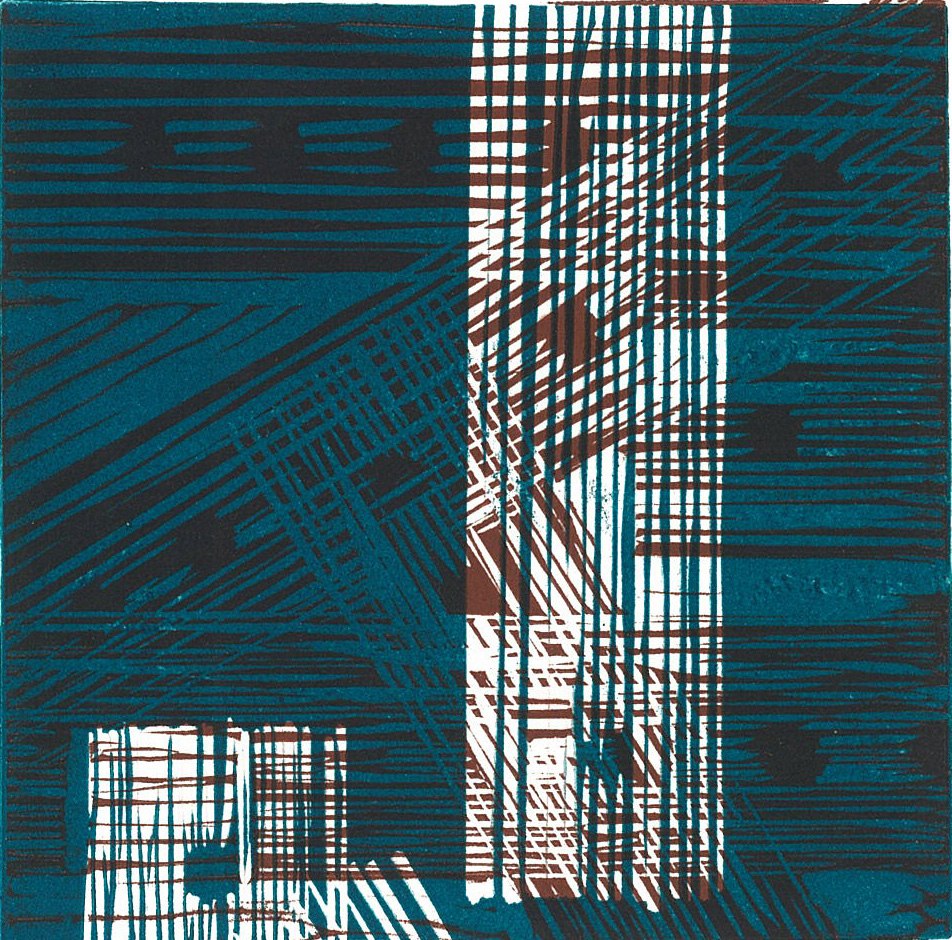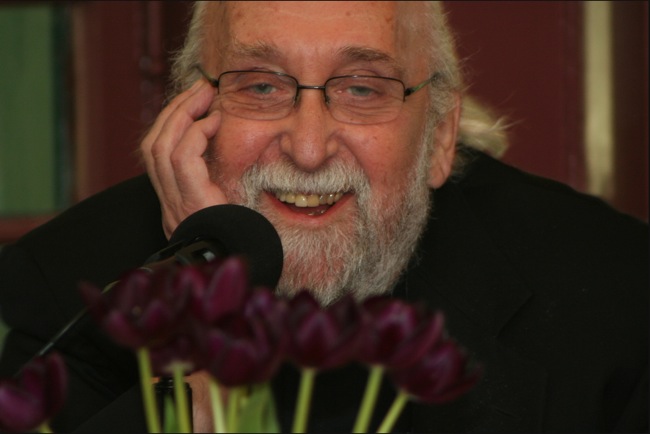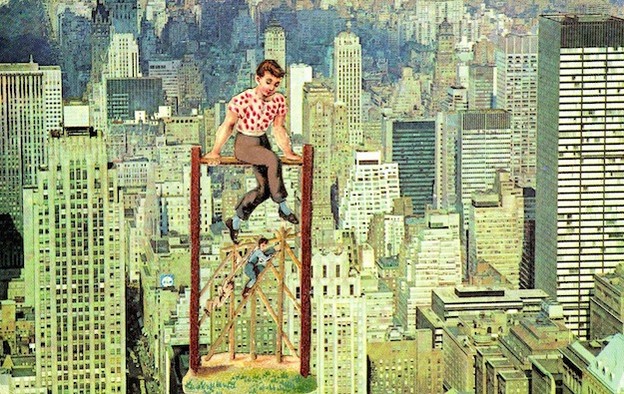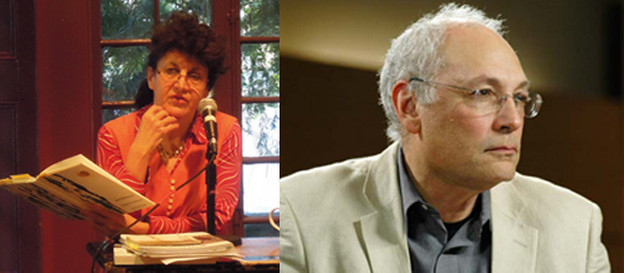|
|
Posted 12/2/2013 (link)
 In the early 60's the poet Lee Harwood heard for the first time, in a London cafe, a poem by Tristan Tzara. An "immediate convert" to Dada, Lee tracked down a few of Tzara's then difficult to find poems and translated them; he eventually also tracked down Tzara himself and met him in Paris. "Chanson Tzara" — with text, translation, and narration by Harwood, and sound and realization by Alexander Baker — is a sound work created around that encounter.
This twenty-seven minute audio composition is an ambitious and fully-dimensional tribute to both Tzara and the chaotic spirit of Dada made contemporary, starting with a hectic sound collage of found samples, ring modulated radio noise, music, and text-to-speech voice generation, which eventually gives way to a touching and elegiac voiceover by Harwood that weaves together memories, translations, and the young poet's conversation with Tzara.
You can listen to this newly-added recording on PennSound's Lee Harwood author page, which is also home to his contribution to the Rockdrill series, The Chart Table, Lee Harwood: Poems 1965–2002, and a 2008 reading as part of the Shearsman Reading Series at Swedenborg Hall in London.
Posted 12/5/2013 (link)
Posted 12/9/2013 (link)
 Edited by Pam Brown, the multi-part feature, "Fifty-One Contemporary Poets from Australia", released in five installments over the course of 2012, is a classic Jacket2 publication, and one that stays true to the journal's roots on the other side of the world. As we worked together on the feature, I begged Pam to put together a companion feature for PennSound, and though she'd already done an astounding amount of curatorial work, she happily agreed to do so.
Today, we're very glad to unveil the fruits of her labor. PennSound's new Australian Poetry page features newly-added recordings from twenty-five poets: Adam Aitken, Ali Alizadeh, Judith Bishop, Ken Bolton, Bonny Cassidy, Stuart Cooke, Laurie Duggan, Kate Fagan, Michael Farrell, Liam Ferney, Duncan Hose, Jill Jones, Kit Kelen, John Kinsella, Peter Minter, Tracy Ryan, Jaya Savige, Pete Spence, Amanda Stewart, Ann Vickery, Corey Wakeling, Alan Wearne, Fiona Wright, Tim Wright, and Mark Young. The majority of these recordings were made over the past several years, and give outsiders an excellent sense of the reading series in Australia and New Zealand that are driving a vital poetry scene (in much the same way that the J2 feature stressed the network of journals sustaining the scene). We've also provided links to the pre-existing author pages for Kate Lilley and John Tranter, who also appeared in the feature.
I'd like to thank Pam for her tireless work putting both of these massive bodies of work together over the course of several years. You can begin exploring this new collection of recordings by clicking the title above, and if you haven't yet taken a look at the original Jacket2 feature, then this is a good opportunity for you to do so.
Posted 12/11/2013 (link)
 There are few figures in contemporary poetry who can qualify as living legends, but without a doubt Jerry Rothenberg is one of them, and today he turns 82!
By happy coincidence, today at Jacket2, Danny Snelson unveiled his latest Reissues project: all twelve issues of the Rothenberg-edited New Wilderness Letter, which ran from 1977 to 1984. Here's a little of Snelson's introductory note:
Jerome Rothenberg's impressive twelve-issue magazine New Wilderness Letter picks up precisely where Alcheringa left off, with a decisive change: "the present work will be more open — more 'coarse and broad' in Whitman's vision for poetry & consciousness — than the previous one." Having departed from the ethnopoetics focus of Alcheringa in 1976, Rothenberg delivered an expansive notion of poesis in his new magazine. David Antin outlines this territory in the first issue: "those linguistic acts of invention & discovery through which the mind explores the transformational power of language & discourse & invents the world & itself." Wilderness, too, receives poetic expansion in George Quasha's formulation cited in the seventh issue: "Wilderness is the counter-space created in relation to each new technological development." Indeed, continuing the expansive synthetic impulse that guided the anthologies Technicians of the Sacred, Shaking the Pumpkin, and America a Prophesy, Rothenberg gathers an impressive and unlikely set of writings, drawings, and images over the course of the magazine's seven years in publication.
You can start exploring the New Wilderness Letter archives here, and don't forget that the complete run of Alcheringa can be found here. All of us at PennSound wish Jerry a very happy birthday!
Posted 12/23/2013 (link)
 While it's already received quite a lot of (well-deserved) attention, we wanted to make sure you didn't miss out on the recent Jacket2 feature, "Traveling Furiously Toward You: John Ashbery and the Arts," which first appeared earlier this month. Edited by Thomas Devaney and Marcella Durand, this multiform feature manages to find new approaches to a well-established (and mythologized) poetic career and includes a diverse array of pieces by John Yau, Harry Matthews, Jennifer Moxley, Rosanne Wasserman, Trevor Winkfield, Ed Roberson, Sandra Lim, Adam Fitzgerald, John Emil Vincent, Mark So, Emily Skillings, and the late Wanda Coleman. The feature's rounded out by a few of the poet's translations of Francis Ponge, along with three of his collages that were recently exhibited at Tibor de Nagy Gallery.
|
PennSound Daily archive
2025
2024
2023
2022
2021
2020
2019
2018
2017
2016
2015
2014
2013
2012
2011
2010
2009
2008
2007
|





